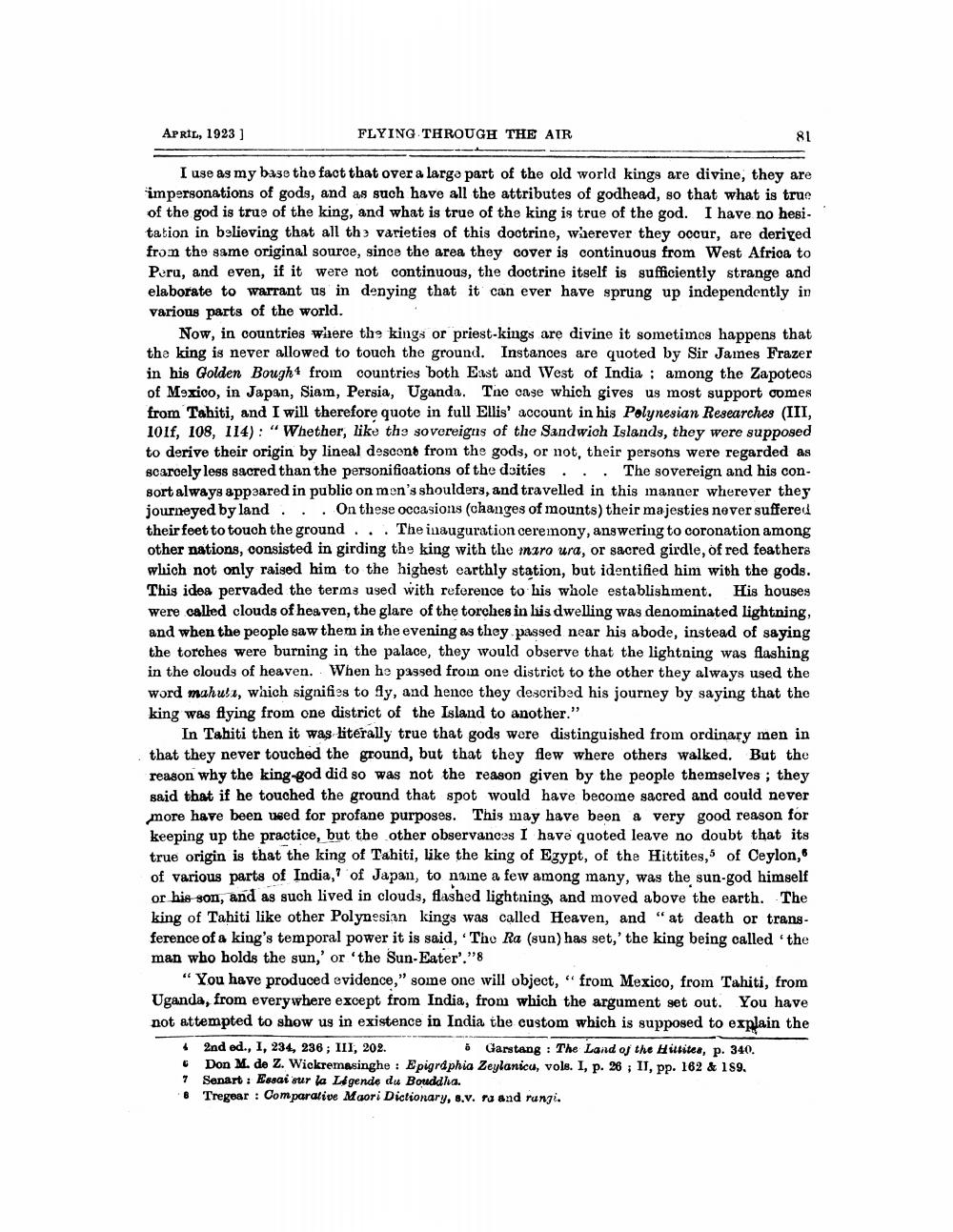________________
APRIL, 1923)
FLYING THROUGH THE AIR
81
I use as my base the fact that over a large part of the old world kings are divine, they are impersonations of gods, and as such have all the attributes of godhead, so that what is true of the god is true of the king, and what is true of the king is true of the god. I have no hesi. tation in believing that all th> varieties of this doctrine, wherever they occur, are derived from the same original source, since the area they cover is continuous from West Africa to Peru, and even, if it were not continuous, the doctrine itself is sufficiently strange and elaborate to warrant us in denying that it can ever have sprung up independently in various parts of the world.
Now, in countries where the kings or priest-kings are divine it sometimes happens that the king is never allowed to touch the ground. Instances are quoted by Sir James Frazer in his Golden Bough4 from countries both East and West of India : among the Zapotecs of Mexico, in Japan, Siam, Persia, Uganda. The case which gives us most support comes from Tahiti, and I will therefore quote in full Ellis' account in his Polynesian Researches (III, 101f, 108, 114): "Whether, like the sovereigns of the Sandwich Islands, they were supposed to derive their origin by lineal descont from the gods, or not, their persons were regarded as scarcely less sacred than the personifications of the doities ... The sovereign and his consort always appeared in public on men's shoulders, and travelled in this manner wherever they journeyed by land ... On these occasions (changes of mounts) their majesties never suffered their feet to touch the ground ... The inauguration ceremony, answering to coronation among other nations, consisted in girding the king with the inaro ura, or sacred girdle, of red feathers which not only raised him to the highest earthly station, but identified him with the gods. This idea pervaded the terms used with reference to his whole establishment. His houses were called clouds of heaven, the glare of the torches in luis dwelling was denominated lightning, and when the people saw them in the evening as they passed near his abode, instead of saying the torches were burning in the palace, they would observe that the lightning was flashing in the clouds of heaven. When ho passed froin one district to the other they always used the word mahuli, which signifies to Ay, and hence they described his journey by saying that the king was flying from one district of the Island to another."
In Tahiti then it was literally true that gods were distinguished from ordinary men in that they never touched the ground, but that they flew where others walked. But the reason why the king-god did so was not the reason given by the people themselves ; they said that if he touched the ground that spot would have become sacred and could never more have been used for profane purposes. This may have been a very good reason for keeping up the practice, but the other observances I have quoted leave no doubt that its true origin is that the king of Tahiti, like the king of Egypt, of the Hittites, of Ceylon, of various parts of India,' of Japan, to naine a few among many, was the sun god himself or his son, and as such lived in clouds, flashed lightning and moved above the earth. The king of Tahiti like other Polynesian kings was called Heaven, and "at death or transference of a king's temporal power it is said, “The Ra (sun) has set,' the king being called the man who holds the sun,' or 'the Sun-Eater'."'8
"You have produced evidence," some one will object," from Mexico, from Tahiti, from Uganda, from everywhere except from India, from which the argument set out. You have not attempted to show us in existence in India the custom which is supposed to explain the + 2nd ed., I, 234, 236 ; III, 202.
Garstang : The Land of the Hillites, p. 340. 6 Don M. de Z. Wickremasinghe : Epigraphia Zeylanicu, vols. I, p. 26, II, pp. 162 & 189. 7 Senart : Essai sur la Légende du Bouddha. 8 Tregear : Comparative Maori Dictionary, s.v. ra and rungi.




